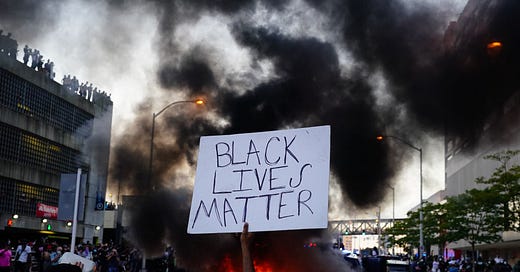
Can you name the scrappy start-up that struck gold in 2020, earning its three female founders worldwide fame and $90 million in company revenue? Multimillion-dollar homes and a production deal with Warner Bros. soon followed, while friends and family were showered in consultant gigs worth millions of dollars.
Capitalizing on the lucrative opportunities afforded to them as high-profile progressives, the three celebrity founders moved on, leaving the operation to wither in the hands of deputies who, sadly, turned on each other. A remarkable spate of legal trouble, brushes with law enforcement, and tangles with the Internal Revenue Service have all but spelled the death of the enterprise that you probably know best as Black Lives Matter.
The spectacular rise and fall of BLM has surprisingly little in common with earlier civil rights campaigns, other than, perhaps, good intentions. How BLM’s leaders exploited George Floyd’s murder to raise millions that they then put into their own pockets more closely resembles the stories of famous grifters like Elizabeth Holmes of Theranos or Sam Bankman-Fried’s foray into “effective altruism.”
Think back for a minute to 2020, when George Floyd was killed by police, and the tens of thousands of people on the left who protested despite Covid-19, wrote “Black Lives Matter” in the middle of roads, and took over a handful of downtowns in places like Minneapolis and Seattle. Think back to the panicked response by corporations that vowed to do better by black America, revved up their diversity, equity, and inclusion programs, and threw millions of dollars at BLM. Think back to the presidential race, where defunding the police was a top issue.
Here we are now, with DEI programs in retreat, corporations no longer willing to make political statements, and the left more obsessed with Israel than police reform. On the campaign trail, Donald Trump and Kamala Harris compete to be the law-and-order candidate. And BLM four years later? It looks like little more than a hustle.
The latest proof point came earlier this month when Tyree Conyers-Page—a.k.a. Sir Maejor Page, the 35-year-old former leader of the BLM chapter of Greater Atlanta—was sentenced to 42 months in federal prison for money laundering and wire fraud. Pocketing the $450,000 raised from 18,000 donors to “fight for George Floyd” and the “movement,” Page spent lavishly on himself, splurging on tailored suits, nightclub bar tabs, an evening with a prostitute, and, as he texted to a friend, “a big-ass cribo” that he bought in Ohio after he “won the lottery.”












